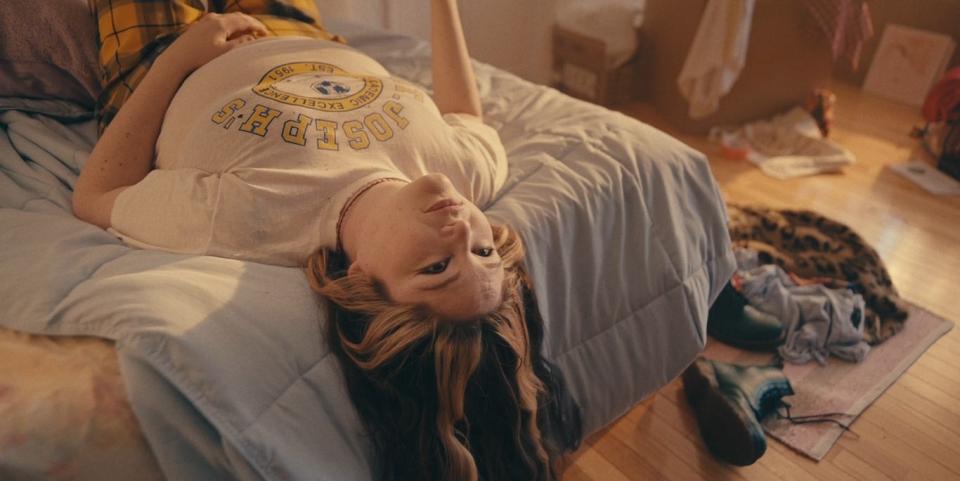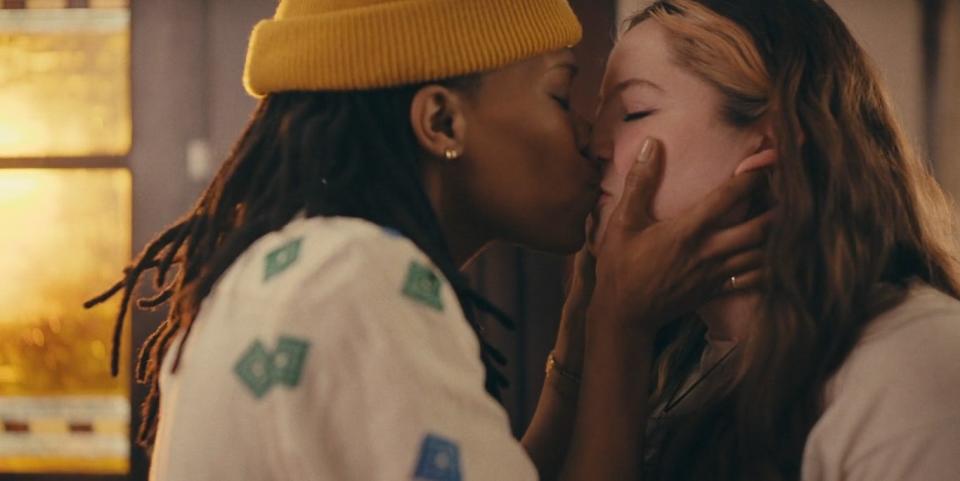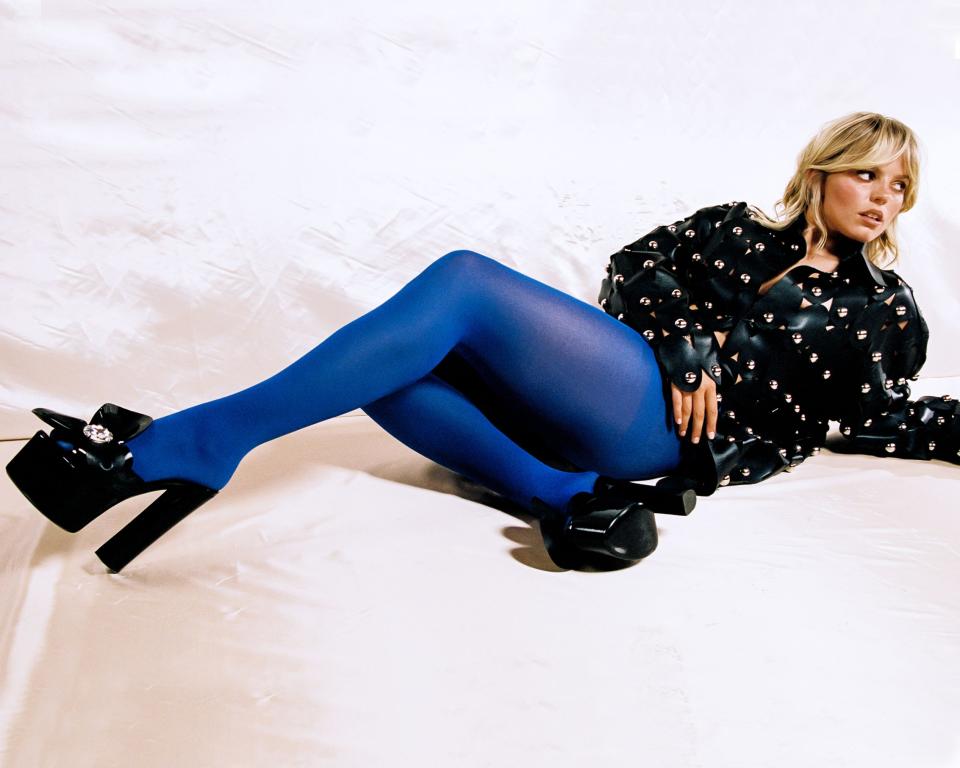Meg Stalter on Cora Bora , Being “Addicted” to the Stage, and God

- Oops!Something went wrong.Please try again later.
Brainstorm Media
Megan Stalter has always been “so addicted to being on stage,” even when she’s been shunted into supporting roles. As a tried-and-true theater kid, she never got the good parts growing up. She played Scragg Number Three in Li’l Abner and a one-line nun in The Sound of Music. Becoming the understudy for Helen Keller’s mother in The Miracle Worker was a major coup.
So when a grown-up Stalter was cast as the lead in the new rom-com Cora Bora after building up credits on shows like Hacks and Queer as Folk, she was more than ready to grab the spotlight — especially because she got to play a singer. “I always wanted to do the solo or be in a singing competition, even though I wasn’t amazing,” she tells me of her time in high-school chorus. “I sang ‘Amazing Grace’ for a singing piece and I was like, ‘Why did I do this? It’s not in my range. I’m nervous.’ I just had this need to perform. It makes me so happy to be on stage.”
Directed by Hannah Pearl Utt with a screenplay by Rhianon Jones, Cora Bora — out now and expanding to more theaters on June 21 — follows the titular character on her quest to make it as a musician in Los Angeles while balancing an open relationship with her girlfriend, Justine (Jojo T. Gibbs) back home in Portland. To put it lightly, Cora is not actually the greatest performer, or the greatest girlfriend, or the greatest daughter — all of which she discovers when she returns to her hometown after finding out that Justine has started a new relationship with another woman (Ayden Mayeri), and no one is particularly excited to see her.
Stalter is used to playing characters who kind of suck, but this marks her first turn as a leading actor in a feature-length film, and her first semi-dramatic role — though you’d never be able to tell from how thoroughly she inhabits the character of Cora, and the way that she discusses her craft. Not everyone who rises to fame through the internet (as Stalter did, through iconic videos like “hi, gay”) is able to transmute their talents successfully into other formats, but it’s clear that Stalter is only getting started. (In other words, we’ll never want to say, ‘bye, gay’ to her. I’m sorry, I’m sorry, I’m trying to delete it...)
Ahead of the film’s premiere, the comedian stopped by Them’s office to discuss her process for playing Cora, her “cool girl” inspirations, and her relationship with God.

cora-bora-inline-a
Brainstorm MediaWas it difficult for you to give a semi earnest performance as a singer in the film?
I think it helps that she’s not supposed to be really good, and the songs are really funny. Miya Folick did such an amazing job with the music. There are a couple songs that are pretty earnest that aren’t funny that I sing, but it wasn’t as hard because at that point, I was like, “OK, I love this character so much. It’s her singing — and it’s good that it’s earnest and not perfect.”
Were there any other ways that you prepared for the movie, because this was also your first semi-dramatic role?
I read the script a bunch. I met with Hannah, the director, a lot; she worked with me on the music. I remember having all these pictures of these cool girls in my room, thinking about what I want Cora to want to look like with her hair. She’s trying to be a cool girl, but actually her heart makes her a cool girl, because she does have such a big heart. But she’s not effortlessly cool at all. I love to play people who are confident but nervous.
Who are some of your cool girl inspirations?
In life or for the movie?
I mean, honestly both.
I definitely had a picture of Dua Lipa with her little money pieces. I get a lot of Fashion Brand Company and I’m friends with them, and I had a lot of pictures of their models in their outfits because they look so cool, and they all look so different. I definitely thought a lot about: What is the same between me and Cora and what’s different? Not saying I’m my own inspiration, but when you’re thinking about preparing for a character, I like to focus on what’s different about us and the same.
What was different between you and Cora, and what were the similarities?
I think that she feels like someone that isn’t fully healed and in love with herself, and I am pretty in love with myself. But it took time in my twenties. I am a God girl, and I don’t know if Cora has God yet, and I hope she finds God at some point, because I think she really wants to feel connected to the world and herself and have community. I think we both have really big hearts. I think neither of us belong in a poly relationship. I would never, and it’s funny that she is, because [there’s] no way that she wants that. We’re both bisexual people who prefer women.
I think we both really love to perform and have a wild spirit. It’s funny because she’s focused on her career, but actually all she wants is to be loved and to love. And that’s what’s important to me: all of this stuff is so fun, but I really know that the only thing that matters is people, God, the love that we all have, and our connection. But I love to perform, and it’s fun. I think Cora hides behind [the idea that] “it’s for my career,” but she doesn’t really care about it in the way that she cares about wanting to be loved.

cora-bora-inline-b
Brainstorm MediaI would love to hear more about your relationship with God.
I grew up in church. Now, I don’t have a church that I go to, but I’m sure there are really cool gay churches that I’d love to find. I definitely feel that when I learned more about myself and realized that I was gay, I [got] closer to God because I feel like I’m becoming who I am or realizing a big part of myself and it makes me feel more connected to the world. I also never felt judgment from God or anything about any of that. It breaks my heart when people think that they can’t have that spiritual connection. I think a lot of us grew up with God or church. Then when you come out, you don’t always know if you can still have that, but it’s the people who make you feel like you cannot. I don’t believe that that’s from God.
I have some good queer church recommendations in New York.
Oh, I bet there’s more queer churches here than non-.
That’s probably correct.
And I’m sure L.A. has a lot. It’s intimidating to find the right one I think, but I want to, because I think it’s really interesting and cool. You don’t always meet people in comedy or in our community who go to church, so you don’t know which ones to go to. But it would be cool to see more people find that because I think that we all want that kind of connection — or at least even if we don’t realize that’s what we want; it feels like everybody wants to connect to something bigger than them.
“There were so many nights when I’d just be Googling ‘gay girl movies,’ ‘gay/bi movie,’ ‘television show with a gay person.’”
What did it mean to you to play a queer and specifically a bisexual character as your first lead?
It’s one of the things that really drew me to the movie. When I read the deck and the script, I was like, “Not only do I want to work with [Hannah], this is the perfect movie for me.” I don’t even know how many bisexual characters I saw growing up besides Ilana and Abbi on Broad City. I know now we have so many more queer stories in the media than we did when I was growing up, but we still need so much more. There were so many nights when I’d just be Googling “gay girl movies,” “gay/bi movie,” “television show with a gay person.”
Also, the poly of it all in this movie is so funny to me. I know that it works for some people, but what I don’t understand is when someone feels pressured to be in a poly relationship when it’s not working for them, because that would torture me. There are people who are poly that are happy in that setup, but Cora is not a poly person. And Justine’s not a poly person. They’re just prolonging the breakup. So it’s fun to play with that.
That was something I thought about. This is actually such a commonplace dynamic in our community — opening your queer relationship to save it — but it’s the first time I’ve seen that represented onscreen.
Right. I think a lot of couples do try that, though. If they’re losing feelings for each other and then one of them maybe has a crush on ... When they open up that door though, if they’re not actually people who are poly, it’s over.
It’s simply over.
It’s a wrap.
Were there any challenges or any surprising things that you found from playing a role that was comedic but also dramatic and earnest?
Since it was one of my first times being a lead or crying on screen or anything, I think it was a learning experience. I realized that if you have to get emotional in a scene, don’t overthink it. You just have to feel connected to the character and story. If you don’t cry, then you’re not supposed to, as long as you’re focusing on the character. I love this character and her band so much.
I also love that in the movie, it’s all about her wanting connection, and it’s framed as a movie about her losing her girlfriend, but really that’s not what’s breaking her heart. I get so emotional about the story that it wasn’t hard for me [to get there]. But I think it was definitely different from anything I’ve ever done before. I think the challenge is when you’re a lead, you’re in every scene every day. So it’s just a lot of work.
What else is on your mind these days?
Hacks season three just came out, and then we just got renewed for another season, which I feel really lucky about. I don’t even know what time it’s coming out, but I just filmed Too Much with Lena Dunham. We filmed in London, and it was really exciting and fun and special. And I’m really excited for people to see it, and I’m excited to see that come together. I’m also performing live again after filming for four or five months. I did a show in New York this weekend, and it was so much fun. I’m so addicted to being on stage. There’s just something about it. Nothing compares.
The pop star goes deep on queerness, anxiety, and her unfiltered reputation.
What is it about being on stage, do you think?
I think it’s the connection with you and the audience. You’re sharing something that will only happen one time. Even if you redo jokes and bits and stuff, every night is exciting, because you never know what’s going to happen, and you’re sharing a special thing together. It’s almost like you’re having an inside joke. I feel the most powerful and confident when I’m on stage and so in control.
Also, in life I’m always like, “I don’t want to hurt anyone’s feelings.” I definitely work on people-pleasing. But when I’m on stage, I do whatever I want. But I still don’t want to hurt anyone’s feelings, so after a show, if I say anything sassy, I’m always like, “I didn’t hurt their feelings, right? They knew I was doing a character, right?”
What do you want people to get out of seeing Cora Bora?
It’s a love story about loving yourself and letting yourself love again after losing something, and to not be closed off to that when you get hurt or lose something. It’s definitely about making those hard decisions to be able to put yourself first and be able to heal.
For whoever sees the movie, that it’s special to them and that they get what we want them to get out of it. It was really special making it. Everyone was so in love with each other on set, and it was really female-led, and everyone was gay and holding hands all the time when we were making it. I wish that I saw more stuff like this when I was younger.
This conversation has been edited and condensed for clarity.
Cora Bora is in expanded theaters June 21.
Get the best of what’s queer. Sign up for Them’s weekly newsletter here.
Originally Appeared on them.


